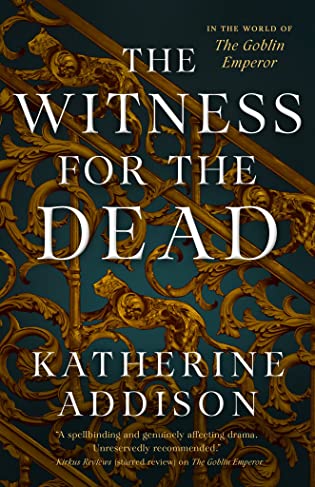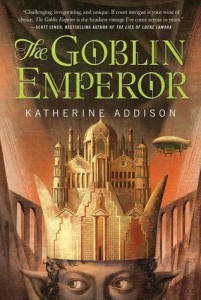 The Witness for the Dead (The Goblin Emperor, #2) by Katherine Addison
The Witness for the Dead (The Goblin Emperor, #2) by Katherine Addison Format: eARC
Source: supplied by publisher via Edelweiss, supplied by publisher via NetGalley
Formats available: hardcover, ebook, audiobook
Genres: fantasy, mystery, steampunk
Series: Goblin Emperor #2, Cemeteries of Amalo #1
Pages: 240
Published by Tor Books on June 22, 2021
Purchasing Info: Author's Website, Publisher's Website, Amazon, Barnes & Noble, Kobo, Bookshop.org
Goodreads
Katherine Addison returns at last to the world of The Goblin Emperor with this stand-alone sequel.
When the young half-goblin emperor Maia sought to learn who had set the bombs that killed his father and half-brothers, he turned to an obscure resident of his father’s Court, a Prelate of Ulis and a Witness for the Dead. Thara Celehar found the truth, though it did him no good to discover it. He lost his place as a retainer of his cousin the former Empress, and made far too many enemies among the many factions vying for power in the new Court. The favor of the Emperor is a dangerous coin.Now Celehar lives in the city of Amalo, far from the Court though not exactly in exile. He has not escaped from politics, but his position gives him the ability to serve the common people of the city, which is his preference. He lives modestly, but his decency and fundamental honesty will not permit him to live quietly. As a Witness for the Dead, he can, sometimes, speak to the recently dead: see the last thing they saw, know the last thought they had, experience the last thing they felt. It is his duty use that ability to resolve disputes, to ascertain the intent of the dead, to find the killers of the murdered.
Celehar’s skills now lead him out of the quiet and into a morass of treachery, murder, and injustice. No matter his own background with the imperial house, Celehar will stand with the commoners, and possibly find a light in the darkness.
My Review:
I read this because I absolutely adored The Goblin Emperor – and I’ve liked many of the author’s books written as Sarah Monette as well. So if you like the one there’s a fairly good chance you’ll like all the others and vice versa.
There’s irony in the above as I picked up The Witness for the Dead because I was hoping for more like The Goblin Emperor. But The Witness for the Dead, in spite of the titular witness being one of the characters introduced in the first book, is absolutely nothing like the first book.
Which doesn’t mean that it isn’t marvelous and well worth reading in its own right, because it’s both. But if you’re expecting another story about high-level political shenanigans and corruption at the heart of the empire wrapped around a coming of age or coming into power story, check those expectations at the door before opening this book.
The Witness for the Dead is a murder mystery, with Thara Celehar, the titular witness for the dead who witnessed for the young emperor’s dead in the earlier story, reaping the “fruits” of his labor in a far-flung corner of the empire that the young goblin emperor Maia now rules.
And that’s as much as there is to the connection between the two stories, meaning that you do not have to have read The Goblin Emperor to get right into The Witness for the Dead. Because court intrigues are pretty much the last thing that Thara Celehar wants to ever be involved with ever again and quite possibly the last thing that anyone with any power whatsoever will ever let him get near even with someone else’s bargepole.
The clerical intrigues he’s stuck in the middle of are quite enough. More than enough. From his perspective, more than annoying and infuriating enough, too, but he’s stuck with those.
Celehar has been assigned to remote Amalo in order to serve his calling as a witness for the dead. Because that’s what he does. He legally serves as a witness for whatever messages or entreaties or truths – especially for the truths – that the recently – make that the very recently – dead are able to transmit through him before they leave all their worldly concerns behind along with their bodies.
He doesn’t hear them speak, not exactly. What he does is witness, as in watch and listen to, their final sights, sounds, impressions and thoughts. And then he acts upon what he has witnessed, whether to bring justice to the dead – or to bring justice or restitution to those the recently departed has wronged.
Some people seek out his services. Some people are not happy with the answers he gives or the results he gets. Some people are frightened to see him coming, while some are grateful that he did.
The cases that find Celehar as he witnesses for the dead in Amalo are a mix of all of the above. A dead opera singer whose murderer should be brought to justice. A grieving family searching for the burial site of their missing sister. A wealthy family caught in the turmoil left behind by their late patriarch and his two contradictory “last” wills and testaments.
It’s Celehar’s job as well as his calling to find answers for the friends and families left behind. Even if those answers are not the answers they wanted. And no matter what Celehar has to go through – or whom – in order to find them.
 Escape Rating A+: Based on the blurb, this wasn’t exactly what I expected. And it doesn’t matter because I absolutely loved it.
Escape Rating A+: Based on the blurb, this wasn’t exactly what I expected. And it doesn’t matter because I absolutely loved it.
For one thing, in spite of the fantasy setting, Celehar’s story mostly reads very much like a historical mystery. The past is as much another country as Amalo is. But people are still people, and murder is still murder. Some of the investigative techniques may be different, but the principles are still the same. “Who benefits?” is an investigative concept that is equally applicable no matter what language it is in.
In the case of the duplicate wills, benefit is the easiest to determine, but the most difficult to bring about. Money, after all, talks, and when the competing sides of this case start using theirs to talk to the powers-that-be, each trying to influence the ultimate decision in their favor, Celehar is caught in the middle – with nearly catastrophic results. Not for the rich beneficiaries, but for poor Celehar whose only interest is in a truth that no one expected to hear.
There is a common element among all three cases. They are all about money. The opera singer was also a blackmailer, and the woman whose burial site was hidden was married for her money – and possibly murdered for it. (There’s that not-so-old saying about money being the root of all evil and every woman needing roots. In these two cases perhaps not so much.)
While there is plenty of satisfaction in the resolution of his cases, what makes this story such a pleasure to read is Celehar’s exploration of this city and the people in it in his pursuit of the truth, as well as the character of Celehar himself. Who is humble, self-effacing, self-sacrificing, and yet supremely talented and more intolerant than is safe or politic of the way that most people are treated – even as he bites his tongue and seems to just accept the way that people in power treat him.
He’s also someone who is bearing up under a load of guilt that he can’t let go of, but as he helps and befriends the people along his path we see that load begin to let go of him. He’s fascinating in his contradictions and I hope we see him again.
Even though this story is part of the world of The Goblin Emperor, the story it reminds me of is not its own predecessor but rather the saga of Penric and Desdemona by Lois McMaster Bujold. Penric and Celehar have a surprising amount in common, as both find themselves in the midst of situations and investigations through the offices of a being who expects them to get on with their work on his behalf without much material assistance. These are both worlds where the supernatural of one type or another is not mythical but actual, and where gods expect work as much as if not more than worship and are not shy about manifesting in one way or another to nudge their agents when needed.
While Penric is considerably less self-effacing than Celehar, I think they’d have as much in common as their stories feel like they do. They also share the fact that I’d very much like more of both!
In the end, The Witness for the Dead was just a story that worked for me on pretty much every level. I loved the protagonist, enjoyed exploring his world, wanted to hang with his friends and punch out his enemies – even though he wouldn’t – and had a grand time following him as he investigated his cases and witnessed for the dead as well as the living who would otherwise have no voice in the world. A fantastic read all the way around!
